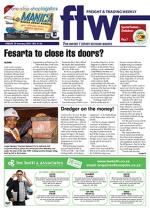Zimbabwe’s ailing economy
is expected to hit its lowest
levels since the end of the
global recession and is
unlikely to improve in the
medium- to long-term, bar
a major political shift to
investor friendly policies.
This is the grim outlook
for the economy according
to senior economist at NKC
Independent Economists,
Christie Viljoen, who
told FTW that while
tobacco farming and
mineral production sectors
were “holding up well”,
secondary and tertiary
sectors were under pressure
from weak consumer,
business and investment
confidence. NKC is a
political and research unit
based in the Western Cape
that analyses the political
and macroeconomic
environment of 30 African
countries.
Viljoen said economic
growth had declined from
an average of 9% per
annum during 2011-2013
to 3.1% last year.
“The country will
not improve on the
2014 performance this
year in the wake of the
political developments
seen in December. Weak
government finances, low
consumer confidence,
and the country’s healthy
import appetite will weigh
down local economic
activity,” he said.
Viljoen said the economy
was not expected to grow
by more than 3% during
2015, with much of this
coming from farming and
mining.
“Consumer price
def lation – a drop in shelf
prices – will continue in
at least the early part of
the year, while domestic
manufacturing capacity
utilisation is likely to
decline further to below
30%,” Viljoen said.
Three quarters of goods
sold in Zimbabwe are
imported, half of these
from South Africa, he
added.
Viljoen said almost
every sector had
been impacted by the
government’s recent
increases in import
duties and surcharges
and the next step was
to introduce more
toll roads. However,
costlier imports would
not stimulate local
production, he said, as
many products remained
cheaper to source
from South Africa and
local factories were
constrained by electricity
and skilled labour
shortages and a lack of
capital investment.
Viljoen said the country’s
major challenge was the
political climate.
“Any hopes for a more
moderate economic policy
regime going forward were
lost when the ruling party
dismissed Vice President
Joice Mujuru. The selection
of Emmerson Mnangagwa
as heir-apparent to President
Robert Mugabe brings a fresh
round of uncertainty over
key issues such as relations
with the west, Zimbabwe’s
indigenisation policy, and the
prospects of external debt
relief,” he said.
Viljoen said the ruling
Zanu-PF, under the
leadership of a faction that
was determined to continue
policies of the past in an
“irrational and unpredictable”
style of leadership, would end
any recovery prospects
and prevent significant
capital inflows due to the
high levels of political risk.
Economy heading for all-time low
30 Jan 2015 - by Lyse Comins
0 Comments
FTW - 30 Jan 15

30 Jan 2015
30 Jan 2015
30 Jan 2015
30 Jan 2015
30 Jan 2015
30 Jan 2015
30 Jan 2015
30 Jan 2015
30 Jan 2015
30 Jan 2015
30 Jan 2015
Border Beat
Featured Jobs
New
New
